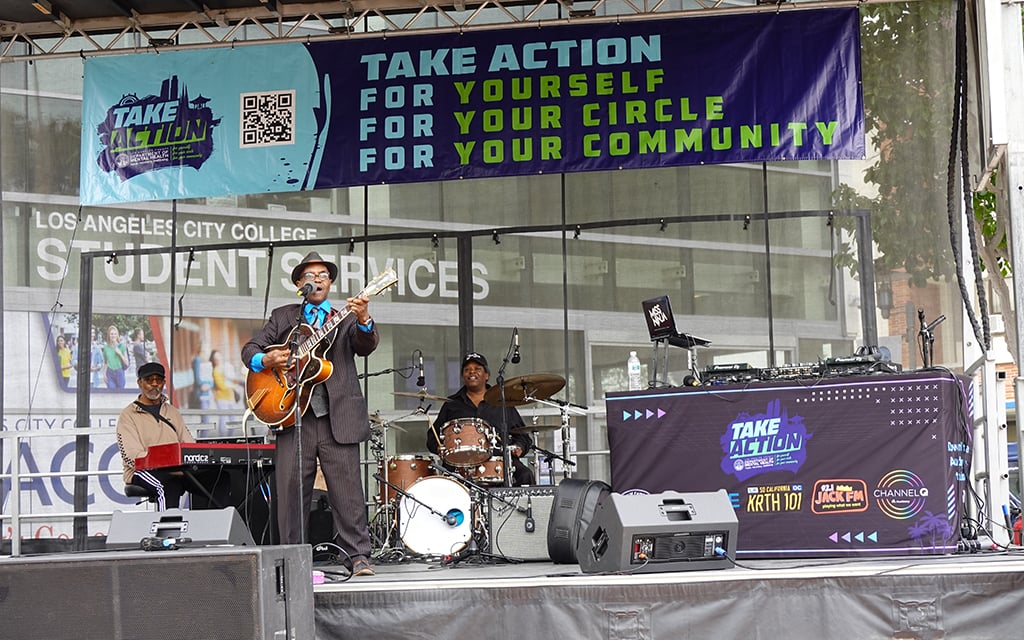LOS ANGELES – Officials have made it clear that mental health is a critical focus for Los Angeles County, and local leaders are continuing to pour money into accessible care and support despite federal funding budget cuts.
During a late March conference, Los Angeles County officials announced $4.15 million in grants for 68 local organizations to host mental health events throughout May as part of the county’s Take Action for Mental Health campaign.
May is nationally recognized as Mental Health Awareness month, and the county will host large-scale events with free wellness activities and community resources.
“It’s critical,” said Mental Health Services Act coordinator Kalene Gilbert of the services provided by the county. “It’s really important we get out there and take initiative and make sure we serve our community.”
The Behavioral Health Services Act is funded by a 1% income tax on California residents who make over $1 million per year, and it helps fund the state’s behavioral health system.
These funds are crucial for a county with a population nearing 10 million people, Gilbert said. She said she is relieved that these funds won’t be cut any time soon.
Recently, the federal government has made numerous cuts to health care-related funds, grants and jobs as part of government-wide spending reductions ordered by Elon Musk’s Department of Government Efficiency, or DOGE.
Just this month, the U.S. Department of Health and Human Services canceled roughly $12 billion in federal grants allocated during the COVID-19 pandemic. In February, roughly 10% of staff working for the federal Substance Abuse and Mental Health Services Administration were fired, impacting the 988 Suicide & Crisis Lifeline.
“It could be quite devastating,” said Theion Perkins, senior deputy director in the county’s Outpatient Care Services Division. “People call 988 for a reason, because they’re in crisis, because they’re struggling with suicide. … It’s instrumental to help people.”
The Behavioral Health Services Act is safe, at least for now, because it’s locally controlled.
“When you talk about being able to hold on during this time of federal actions, it’s scary, like we don’t know what’s going to happen,” Gilbert said. “But we have the Behavioral Health Services Act funds, which are tremendous in making sure that we maintain at least the basics of continuing to serve our communities because we have a huge, huge need here.”
According to the department’s website, the Los Angeles County Department of Mental Health (LACDMH) has provided mental health resources to over 250,000 residents.
The department offers crisis intervention, medication support, peer support and psychotherapy, especially to those who are low-income or uninsured.
During the Take Action for Mental Health, LACDMH holds events featuring meditation, yoga, art classes, music and community resources. LACDMH also partners with the Los Angeles Dodgers, Los Angeles Lakers, Univision and Meruelo Media to promote the events.
“The purpose is to take down the stigma,” Perkins said. “We want to remove that stigma from our mental health, because the brain is an organ, just like any other organ. Shouldn’t you get it treated if it needs treatment?”
Perkins said the campaign events help normalize talking about mental health, which makes it more likely people will take advantage of LACDMH programs.
She remembers a patient she met at one of the 2024 campaign events.
“The lady asked my staff member if we have this service in this city, and the staff member said ‘Yes, we’re right down the street. Come and see us on Monday.’ And the lady just cried. She couldn’t believe that was available,” Perkins said. “So yeah, it’s a good feeling to see people get exposed to what we offer.”
Ultimately, the LACDMH efforts are designed to reduce reliance on emergency rooms and jails by offering more help on the front end of mental health crises. Officials say they want to foster a more compassionate and effective..
“A little bit goes a long way, and it’s much better to provide those services up front than have to provide them on the back end in a crisis,” Gilbert said. “We can deliver services … and kind of course correct for folks in the community.”
The mental health services are available to by anyone, regardless of age, gender, class or other demographic.
County officials recognize how diverse the community is, and say it’s important to offer services for those who may feel othered.
In a survey from the Williams Institute, a research center based in UCLA, 46% of respondents reported they delayed or didn’t get other needed medical care, such as seeing a doctor, in the 12 months prior to taking the survey. Of those who delayed getting needed medical care, 49% said they thought they would be disrespected or mistreated as a trans or nonbinary person.
When it comes to minority groups or those who may identify as part of a small community, mental health services can make all the difference, Perkins said.
“It can help normalize some of what you’re experiencing, and that there is treatment for what you’re experiencing,” she said.

